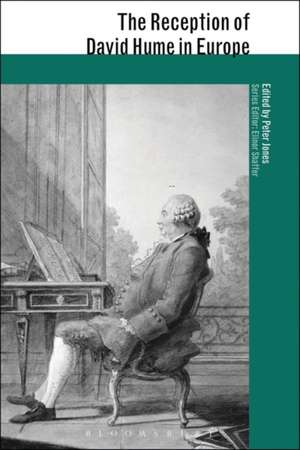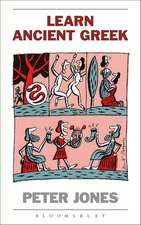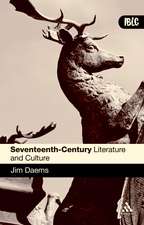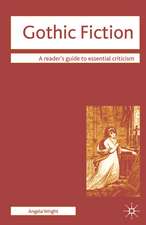The Reception of David Hume In Europe: The Reception of British and Irish Authors in Europe
Editat de Professor Peter Jonesen Limba Engleză Paperback – 2 ian 2013
| Toate formatele și edițiile | Preț | Express |
|---|---|---|
| Paperback (1) | 192.15 lei 6-8 săpt. | |
| Bloomsbury Publishing – 2 ian 2013 | 192.15 lei 6-8 săpt. | |
| Hardback (1) | 1880.17 lei 6-8 săpt. | |
| Bloomsbury Publishing – 3 dec 2005 | 1880.17 lei 6-8 săpt. |
Din seria The Reception of British and Irish Authors in Europe
- 44%
 Preț: 2166.85 lei
Preț: 2166.85 lei - 36%
 Preț: 192.42 lei
Preț: 192.42 lei -
 Preț: 189.28 lei
Preț: 189.28 lei -
 Preț: 192.15 lei
Preț: 192.15 lei -
 Preț: 188.34 lei
Preț: 188.34 lei - 34%
 Preț: 229.75 lei
Preț: 229.75 lei -
 Preț: 193.96 lei
Preț: 193.96 lei -
 Preț: 398.19 lei
Preț: 398.19 lei -
 Preț: 192.99 lei
Preț: 192.99 lei -
 Preț: 190.44 lei
Preț: 190.44 lei - 34%
 Preț: 230.90 lei
Preț: 230.90 lei -
 Preț: 586.90 lei
Preț: 586.90 lei -
 Preț: 190.81 lei
Preț: 190.81 lei - 36%
 Preț: 192.15 lei
Preț: 192.15 lei - 36%
 Preț: 192.42 lei
Preț: 192.42 lei - 44%
 Preț: 1667.84 lei
Preț: 1667.84 lei - 44%
 Preț: 1317.79 lei
Preț: 1317.79 lei - 44%
 Preț: 1317.79 lei
Preț: 1317.79 lei - 44%
 Preț: 1433.99 lei
Preț: 1433.99 lei - 35%
 Preț: 193.18 lei
Preț: 193.18 lei -
 Preț: 229.37 lei
Preț: 229.37 lei - 17%
 Preț: 329.44 lei
Preț: 329.44 lei -
 Preț: 1893.83 lei
Preț: 1893.83 lei -
 Preț: 1667.84 lei
Preț: 1667.84 lei - 14%
 Preț: 1471.24 lei
Preț: 1471.24 lei - 36%
 Preț: 1783.83 lei
Preț: 1783.83 lei
Preț: 192.15 lei
Nou
Puncte Express: 288
Preț estimativ în valută:
36.77€ • 38.49$ • 30.60£
36.77€ • 38.49$ • 30.60£
Carte tipărită la comandă
Livrare economică 31 martie-14 aprilie
Preluare comenzi: 021 569.72.76
Specificații
ISBN-13: 9781441102423
ISBN-10: 1441102426
Pagini: 434
Ilustrații: black & white illustrations
Dimensiuni: 156 x 234 x 24 mm
Greutate: 0.64 kg
Editura: Bloomsbury Publishing
Colecția Bloomsbury Academic
Seria The Reception of British and Irish Authors in Europe
Locul publicării:London, United Kingdom
ISBN-10: 1441102426
Pagini: 434
Ilustrații: black & white illustrations
Dimensiuni: 156 x 234 x 24 mm
Greutate: 0.64 kg
Editura: Bloomsbury Publishing
Colecția Bloomsbury Academic
Seria The Reception of British and Irish Authors in Europe
Locul publicării:London, United Kingdom
Caracteristici
The first comprehensive reference guide to the reception of Hume's philosophical writings in Europe.
Notă biografică
Peter Jones is Emeritus Professor of Philosophy at the University of Edinburgh.
Cuprins
Series Editor's Preface - Elinor Shaffer; AcknowledgementsList of ContributorsTimelineIntroduction - Peter Jones1. Hume's Reception in Ireland - M.A. Stewart2. The Early British Reception of Hume's Writings on Religion - M.A. Stewart3. Hume's Reception in France - Michel Malherbe4. The Reception of Hume in Germany - Manfred Kuehn5. David Hume and Sir James Steuart - Andrew S. Skinner6. Italian Responses to David Hume - Paola Zanardi7. Translations of Hume's Works in Italy - Emilio Mazza8. Hume in Russia; Tatiana V. Artemieva and Mikhail I. Mikeshin9. The Reception of David Hume's Philosophy in Sweden - Henrik Lagerlund10. David Hume and Polish Philosophical and Social Thought - Bozena Kusnierz; 11. 'Ignoramus': David Hume's Ideas in the Hungarian Enlightenment - Pál Ács; 12. The Reception of David Hume in Czech Thought - Josef Moural; 13. The Reception of David Hume in Romania - Andreea Deciu Ritivoi; 14. Canonization and Critique: Hume's Reputation as a Historian - Mark Salber Phillips and Dale R. Smith; 15. The Reception of Hume in Nineteenth-Century British Philosophy - James A. Harris;16. The Scientific Reception of Hume's Theory of Causation: Establishing the Positivist Interpretation in Early Nineteenth-Century Scotland - John P. Wright; Bibliography; Index
Recenzii
The Reception of David Hume in Europe provides invaluable clues as to how the reception of an author's work impacts its status as a classic. And, perhaps more importantly, it presses us to revise our conception of what is now, particularly in the Anglo-American world, taken to be the quintessential philosophical classic, namely Hume's Treatise of Human Nature...The Reception can be read as telling the history of the different lives of Hume's works - the story of the 'making of' what is now, for us, a philosophical classic... And this story needs to be told.
Reviewed in Tijdschrift Voor Filosofie (Journal of the Institute of Philosophy, of the Catholic University of Leuven), 2007 issue.
Reviewed in Tijdschrift Voor Filosofie (Journal of the Institute of Philosophy, of the Catholic University of Leuven), 2007 issue.














